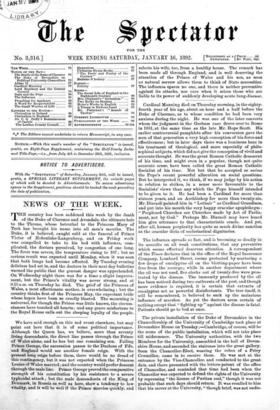Cardinal Manning died on Thursday morning, in the eighty- fourth
year of his age, about an hour and a half before the Duke of Clarence, as to whose condition he had been very anxious during the night. He was one of the later converts whom the judgment in the Gorham case drove over to Rome in 1851, at the same time as the late Mr. Hope Scott. His earlier controversial pamphlets after his conversion gave the men of that generation a very high conception of his force and effectiveness; but in later days there was a luminous haze in his treatment of theological, and more especially of philo- sophical subjects, which did not give the conception of vivid and accurate thought. He was the great Roman Catholic democrat of his time, and might even in a popular, though not quite accurate sense, have been called the great Roman Catholic Socialist of his time. Not but that he accepted ex animo the Pope's recent powerful allocation on social questions. But he interpreted it, we think, if we may judge by his action in relation to strikes, in a sense more 'favourable to the Socialists' views than any which the Pope himself intended to be given to it. He had been a Cardinal for more than sixteen years, and an Archbishop for more than twenty-six. Mr. Disraeli painted him in " Lothair " as Cardinal Grandison, and put into his month the very happy oracular apophthegm : " Perplexed Churches are Churches made by Act of Parlia- ment, not by God." Perhaps Mr. Disraeli may have heard him give utterance to that characteristic oracle. And yet, after all, human perplexity has quite as much divine sanction as the oracular dicta of ecclesiastical dignitaries.


































